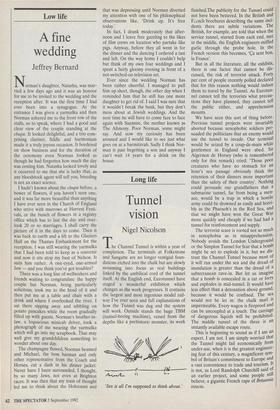Long life
Tunnel vision
Nigel Nicolson
The Channel Tunnel is within a year of completion. The terminals at Folkestone and Sangatte are no longer vestigial foun- dations etched into the chalk but are slowly swimming into focus as real buildings linked by the umbilical cord of the tunnel itself. At the English end, Eurotunnel have staged a wonderful exhibition which changes as the work progresses. It contains the largest and most ingenious model rail- way I've ever seen and full explanations of how the Tunnel was dug and the system will work. Outside stands the huge TBM (tunnel-boring machine), raised from the depths like a prehistoric monster, its work `Sex is all I'm supposed to think about.'
finished.The publicity for the Tunnel could not have been bettered. In the British and Ficnch brochures describing the same inci- dents there are subtle variations. The British, for example, are told that when the service tunnel, started from each end, met in the middle, the English engineers sniffed garlic through the probe hole. In the French version this becomes, `ca sent bon, la France'.
But in all the literature, all the exhibits, there is one factor that cannot be dis- cussed, the risk of terrorist attack. Forty per cent of people recently polled declared that for this reason nothing would induce them to travel by the Tunnel. As Eurotun- nel cannot tell the terrorists what precau- tions they have planned, they cannot tell the public either, and apprehension mounts.
We have seen this sort of thing before. Previous tunnel projects were invariably aborted because xenophobic soldiers per- suaded the politicians that an enemy would use the tunnel to invade. Our terminal would be seized by a coup-de-main while gentlemen in England were abed. Sir Algernon de Horsey (who is remembered only for this remark) cried: 'Those poor creatures who have no stomach for an hour's sea passage obviously think the retention of their dinners more important than the safety of their country'. Nothing could persuade our grandfathers that a submarine tunnel, far from being a men- ace, would be a trap in which a hostile army could be drowned as easily and horri- bly as the Pharaoh's in the Red Sea, and that we might have won the Great War more quickly and cheaply if we had had a tunnel for reinforcement and supply. The terrorist scare is rooted not so much in xenophobia as in misapprehension. Nobody avoids the London Underground or the Simplon Tunnel for fear that a bomb might be set to explode in it, but we dis- trust the Channel Tunnel because most of it will run under the sea and the dread of inundation is greater than the dread of a subterranean cave-in. But let us imagine that a bomb is concealed in a car or lorry and explodes in mid-tunnel. It would have less effect than a detonation above ground, because it would be confined. The sea would not be let in: the chalk marl is impermeable. Every wagon is fireproof and can be uncoupled at a touch. The carriage of dangerous liquids will be prohibited. The middle tunnel of the three is an instantly available escape route.
This is beginning to sound as if I am an expert. I am not. I am simply worried that the Tunnel might fail economically from under-use, when it is the greatest engineer- ing feat of this century, a magnificent sym- bol of Britain's commitment to Europe and a vast convenience to trade and tourism. It is not, as Lord Randolph Churchill said of an earlier project, and some people still believe, a gigantic French rape of Britannia intacta.


















































 Previous page
Previous page